

Revision Techniques. 10 Ways To Revise Better. With exams just around the corner, students often wonder 'how to revise for exams effectively?
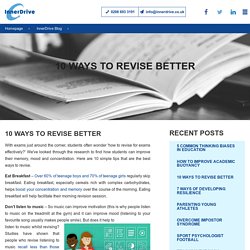
' We've looked through the research to find how students can improve their memory, mood and concentration. Here are 10 simple tips that are the best ways to revise. Eat Breakfast – Over 60% of teenage boys and 70% of teenage girls regularly skip breakfast. Eating breakfast, especially cereals rich with complex carbohydrates, helps boost your concentration and memory over the course of the morning. Eating breakfast will help facilitate their morning revision session. Don’t listen to music – So music can improve motivation (this is why people listen to music on the treadmill at the gym) and it can improve mood (listening to your favourite song usually makes people smile). Listen to music whilst revising? Put phones away - Having your phone out and in sight, even if you are not using it, can make you perform 20% worse than if you had put your phone away. Top 10 Exam Revision Techniques.
Revising For Exams - Top Ten Tips. Two sides to every coin. The '10-minute rule' Getting started with revision is the most difficult part of exam preparation for most people, and many of us could win prizes for avoiding things we don't want to do.
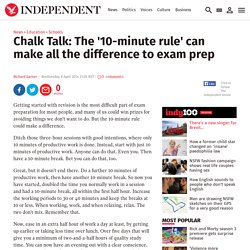
But the 10-minute rule could make a difference. Ditch those three-hour sessions with good intentions, where only 10 minutes of productive work is done. Instead, start with just 10 minutes of productive work. Anyone can do that. Even you. Great, but it doesn't end there. Now, ease in an extra half hour of work a day at least, by getting up earlier or taking less time over lunch. Being calm and thoughtful will help you to get the most out of your preparation. George Turnbull, known as the 'exams doctor', is with the Chartered Institute of Educational Assessors (CIEA) Exam revision tips from successful pupils. Revision Guide. The Science of Successful Learning. The Learning Scientists. About the six strategies for effective learning resources: These resources were created based on research from cognitive psychology from the past few decades.
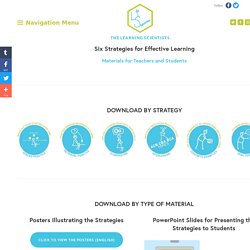
To learn more about how we created the materials, see this blog. The materials are intended to teach about principles of learning and to provide teachers and students with flexible guiding principles to guide learning and studying. However, they are not intended to fix all problems within education. Further, we cannot guarantee success, and we cannot predict students' grades based on the use of these strategies. Fair use of the materials: What works, What doesn't. Revision dos and don'ts. Effective Revision Strategies. There is a lot of cognitive science research that proves what revision strategies work best for embedding information into the long term memory – which is our goal in relation to exam success.
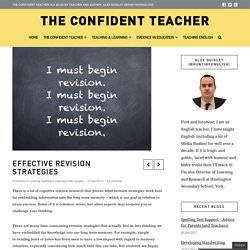
Some of it is common sense, but other aspects may surprise you or challenge your thinking. Take Notes by Hand for Better Long-Term Comprehension. Dust off those Bic ballpoints and college-ruled notebooks — research shows that taking notes by hand is better than taking notes on a laptop for remembering conceptual information over the long term.
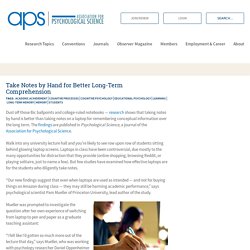
The findings are published in Psychological Science, a journal of the Association for Psychological Science. Walk into any university lecture hall and you’re likely to see row upon row of students sitting behind glowing laptop screens. Laptops in class have been controversial, due mostly to the many opportunities for distraction that they provide (online shopping, browsing Reddit, or playing solitaire, just to name a few). But few studies have examined how effective laptops are for the students who diligently take notes. “Our new findings suggest that even when laptops are used as intended — and not for buying things on Amazon during class — they may still be harming academic performance,” says psychological scientist Pam Mueller of Princeton University, lead author of the study.
Supporting Learning Through Effective Revision Techniques. The 15 minute forum tonight was led by yours truly.
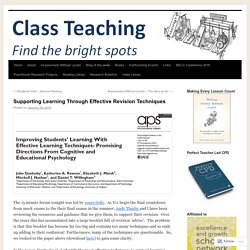
As Y11 begin the final countdown from mock exams to the their final exams in the summer, Andy Tharby and I have been reviewing the resources and guidance that we give them, to support their revision. Over the years this has accumulated into a large booklet full of revision ‘advice’. The problem is that this booklet has become far too big and contains too many techniques and so ends up adding to their confusion! Furthermore, many of the techniques are questionable. Revision and memory strategies - University of Reading. Revision Magazine. Revision Stations. UPDATED- APRIL 2014Resources:Online timer-displayed on the Smart Board/ProjectorOther resources listed below-when each station is explained!

Before students enter have these stations set up in your room…This revision session runs totally independently if you prepare for them- you will not do much in the actual lesson- so it is well worth it! I have used THINK TAX for these revision sessions- to encourage more independent learning/understanding/applying of knowledge. Click here for more information…How It Works: Structured revision lessons using retrieval, spacing & interleaving.
The problem with many revision classes is that many teachers think that students can suddenly self organise and self motivate.
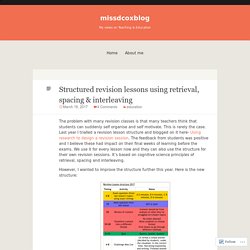
This is rarely the case. Last year I trialled a revision lesson structure and blogged on it here- Using research to design a revision session. The feedback from students was positive and I believe these had impact on their final weeks of learning before the exams. Revision is about quality not quantity. The run-up to exam season is a tense time.
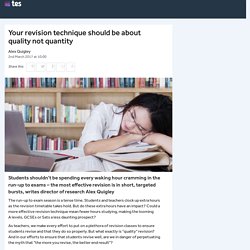
Students and teachers clock up extra hours as the revision timetable takes hold. But do these extra hours have an impact? Could a more effective revision technique mean fewer hours studying, making the looming A levels, GCSEs or Sats a less daunting prospect? Why I Hate Highlighters! As an English teacher I am surely granted the eternal power of an exaggeration fueled headline every once in a while.
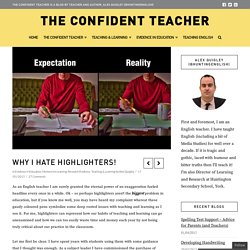
Exam Revision and Overconfidence. It is that time of year again. Nerves fray, students and teachers (probably parents too) as we arm our students with the obligatory revision strategies, resources, wall plans, flashcards, apps, highlighters, revision guides, and whatever else we can get our hands on, in the flimsy hope that some of it sticks. After a decade or so of guessing when it came to revision strategies and approaches, not to mention the complex emotional mass that is the teenage brain, I have begun to build a more reliable picture from research evidence about the best strategies and methods. Memory for Learning: 10 Top Tips. Students need to think hard if they are to remember what they learn. Of course, their brain can be active, fizzing with ideas and connecting up concepts, without them leaving their seat.
‘Active learning’ in this sense means thinking hard and not passively receiving information. Rather than re-reading class notes, a student summarises the key ideas from the notes and using a graphic organiser to reshape the content into a new, meaningful pattern. The student is actively grappling with the content, reshaping, rehearing, challenging, connecting and more, in novel and creative ways. 2.
We know that students remember the words of songs and can sing them verbatim. 3. Create opportunities for students to take over the teaching. The Long and Winding Road (of Revision) Teachers and students need to recognise that mastering exam success, even in our new, more challenging conditions, is achievable. Stress is a challenge, but we can mitigate and even control its impact if we help young people maximise their memory potential. We need to teach more cannily, with the destination in our view and with long-term memory in mind.
Revision Compilation. Debriefs and modelling. I have been a teacher for 26 years, a Headteacher for 11 years and, at the age of 50, this much I know about what REALLY WORKS when preparing students for their examinations! I am keener than ever to spend as much time as possible in classrooms. As I wrote in a post last October, leading our teachers’ own learning about teaching, is, I feel, the most important thing I do in my role as a Headteacher. Can we teach students effective ‘revision skills’? Teaching practice: Revision.